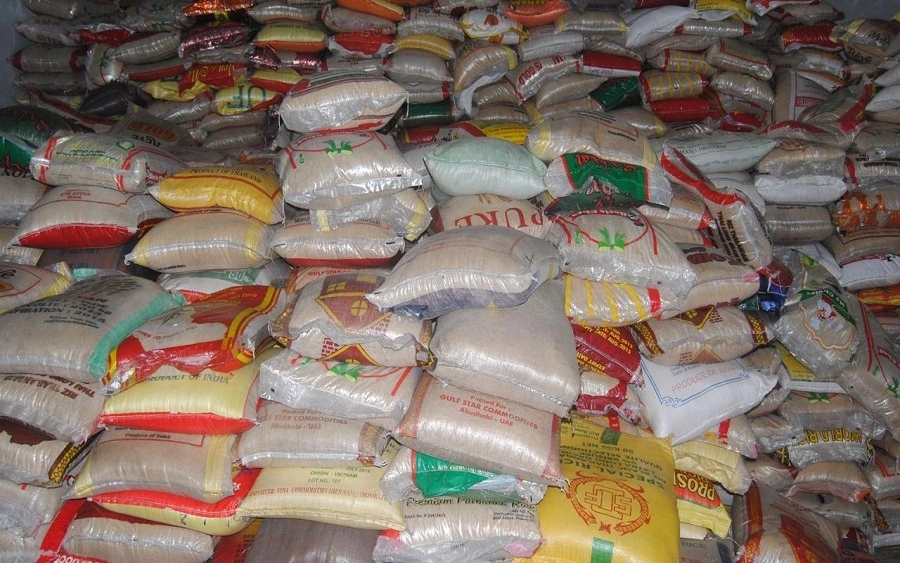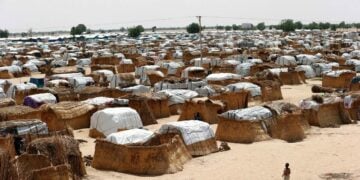Twenty-seven days after the fuel tanker explosion occurred at Dikko Junction near Suleja in Niger State, survivors and families of those who died in the accident have alleged short-change in the distribution of food items released for their succour by President Bola Ahmed Tinubu.
They accused officials of the National Emergency Management Agency (NEMA) and the Niger State Emergency Management Agency (NSEMA) of stage-managing the exercise and giving each beneficiary only two “mudus” (local measurement size) of rice and beans (altogether 18 cups) of the two items as against a bag each they were promised at the flag-off ceremony.
On January 18, 2025, the fuel tanker loaded with 60,000 litres of petrol fell at the Dikko junction near Suleja, where the residents stormed to collect the spilled content. The tanker later exploded, resulting in the death of 92 victims. Several others, who were wounded were rushed to three tertiary hospitals on the order of President Tinubu.
Meanwhile, sources within the various committees raised by the state government on the Dikko tanker disaster have revealed to LEADERSHIP Weekend that 114 people have so far died from the explosion as against the 92 deaths recorded on the day of the incident.
It was gathered that most of the victims taken to the National Hospital in Abuja and the University of Abuja Teaching Hospital (UATH) in the Federal Capital Territory (FCT) did not survive. The only survivors were the two admitted at the Federal Medical Centre (FMC), Jabi, who the management said had been discharged.

One of the sources put the figure of those who died in the hospitals at 22.
The aggrieved beneficiaries of the presidential relief materials brought to the Dikko Primary Healthcare Centre by NEMA for distribution to the families of the victims and survivors claimed that after the NEMA director-general flagged off the event, they were taken to the clinic section of the health centre for the items to be shared.
According to them, they were shocked when the officials said that each beneficiary would be given a “mudu” of rice and a “mudu” of beans as against one bag of rice and a bag of beans the NEMA boss had told them.
Some of the families told LEADERSHIP Weekend that NEMA brought the emergency materials to them on January 20, 2025, two days after the explosion.
It was learnt that the relief materials comprised 200 bags of 25 kg of rice and another 200 bags of maize of the same size, 50 cartons of vegetable oil, 20 cartons of maggi, 20 cartons of tomato paste and 20 bags of salt.
They alleged that all the items were handed over to NEMA coordinating officials and their colleagues in the Niger State Emergency Management Agency (NSEMA).
There were also medical items such as drips, iodine, gloves and analgesics, which were distributed to hospitals in Dikko, Suleja, Tafa and Maje to help in the emergency operations.
Some families of the victims who claimed that they protested the sharing of the grains to them in “mudus” alleged that the officials insisted that the distribution was done transparently.
A member of one of the victims’ families in Dikko who preferred anonymity claimed that her sister sustained first degree burnt but after putting her name down she did not benefit from the relief materials.
Another member of a victim’s family Mohammed Adamu however said he got half of a 25kg bag of rice and maize each.
Similarly, a victim whose shops were razed down and lost his wares, Jibrin Abubakar, said his destroyed goods were worth over N23 million, stressing that a 25 kg bag of rice would not assuage his condition.
At the NEMA coordinating office in Minna, the Niger State capital, no official of the agency was on ground to speak on the distribution of the relief materials but the public relations officer of NSEMA Ibrahim Hussein confirmed that the items were distributed to the victims in collaboration with the community leaders and the two agencies.
He said based on the need of the victims, some got a bag of each of the items while others who were grouped into three shared two bags, adding that the distribution was transparently conducted.
Exercise Was Transparent, Involved Community Leaders – NEMA Spokesperson
At the headquarters of NEMA in Abuja, the management debunked the allegations that its officials failed to share the approved quantity of the food and medical items including, rice and beans to victims of Dikko fuel tanker explosion in Niger State.
NEMA was reacting to claims by some residents of the community that despite its DG’s promise that each family of the affected victims would get a bag of rice and beans, her officials only gave them a “mudu” of rice and beans each.
The agency spokesperson, Ezikiel Manzo, denied the allegations, describing them as the handiwork of attention seekers who, instead of sympathising with the victims of the fire incident, were trying to take what was meant to cushion the pains of the affected persons.
Manzo said, “The DG did not promise anybody. The DG flagged off the distribution and the materials were then distributed to the victims,” adding that “anybody attributing any promise to the DG is just trying to seek attention.”
He said the number of the dead and injured victims was known to everyone, which makes it easy for the distribution of the food and medical items from NEMA.
The NEMA spokesman said those who complained of not getting the items are other members of the community who thought the items were for everybody. “These things were for families affected! The community leaders know the people that were directly affected. And so, those items were taken there to assist them.”
Manzo urged those not affected to sympathise with the victims and not wanting to cash in on their plight. “The NEMA items are for people that were truly affected,” he insisted.
He said the food items were shared by a joint team of NEMA, the state emergency management agency, some local government officials and a chief of staff to the former governor of Niger State among other stakeholders in attendance. “It wasn’t a one man or one agency show. The distribution was not done by one organisation. The members of the community that were affected know the victims.
“Every family affected as per the dead and sick people got at least a bag” of rice or beans. The items delivered that day were enough for people that were affected by the fire incident,” he stated.
“These items were meant for the family members of the people that lost their lives and those injured by the fire. Some members of the community were looking at the food items as a gift for them and for the community,” he declared.
The NEMA spokesman said instead of waiting to benefit from palliatives for victims of disasters, Nigerians should help the agency to prevent those avoidable disasters by quickly intervening to forestall them.
“It may look as if I’m talking arrogantly, but they should be quick to also help to prevent things and not to be quick to catch up on the situation, to cast aspersions,” he said in a response to our correspondent in Abuja.
Most Victims Rushed To Abuja Tertiary Hospitals Died
NSEMA had announced that 92 people died at the spot of the inferno but findings by LEADERSHIP Weekend revealed that the death toll had gone up to 114 people as 22 more victims died in two of the hospitals they were taken to for treatment in Abuja.
The deceased were transferred to the Abuja hospitals from Suleja, Tafa and Dikko General Hospitals with no clear update from the medical team set up by state government to ensure proper medical attention.
It was learnt that while both the federal and Niger State governments promised to take care of the medical needs of the earlier 63 injured victims, those who suffered several degrees of burnt were still being catered for by their families.
Following the incident, the Minister of Health and Social Welfare, Prof. Ali Pate, had directed that some of the severely injured victims be moved from general hospitals in Niger State to the University of Abuja Teaching Hospital (UATH), Federal Medical Centre (FMC), Jabi, and the National Hospital, Abuja for advanced medical care.
At UATH, 19 victims were initially received. However, when our correspondent visited the hospital on January 21, only 16 remained, as three had died on the night of their arrival. Four victims were sent to the National Hospital, Abuja, while two were transferred to FMC, Jabi.
However, findings by LEADERSHIP Weekend indicated that most of the transferred victims did not survive. All the four patients at the National Hospital, Abuja succumbed to their injuries. A source at UATH also claimed that almost all the 16 victims at the facility had died.
Earlier, UATH had raised concerns over the huge financial burden associated with treating burn victims of such severity. The hospital had urged swift action on financial pledges made by the United States government and the federal government to support treatment costs.
The chairman of UATH’s Medical Advisory Committee, Dr. Bob Okonu, had emphasised the immense challenges of managing patients with severe burns. “We deployed over 20 cartons of saline for resuscitation and strong antibiotics to prevent infections. The first week is critical, as infections posed the biggest risk to survival.
“Managing such cases is extremely capital-intensive. Each patient requires an estimated N6 to N7 million within the first week alone. With 16 patients under our care, the financial implications are enormous. The costs cover fluids, antibiotics, surgical supplies, and specialised nutrition,” he had said.
At the time of filing this report, officials of the two hospitals did not respond to inquiries on the state of the patients or the status of the financial pledges.





